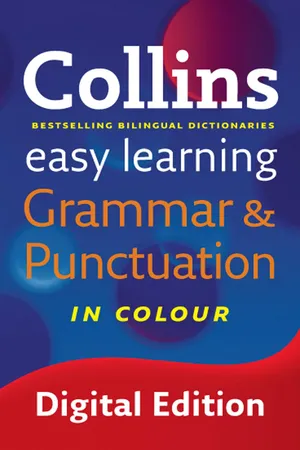
- English
- ePUB (mobile friendly)
- Available on iOS & Android
eBook - ePub
About this book
Collins Easy Learning Grammar is an accessible guide to English grammar and punctuation.
With clear, concise explanations on everything from adverbs to word order, and from apostrophes to semicolons, this e-book is indispensable for understanding correct usage.
Tools to learn more effectively

Saving Books

Keyword Search

Annotating Text

Listen to it instead
Information
Types of main verb
Verbs of action
Most verbs describe an action such as walking, running, or reading.
John is running for the train.
Sophie has just bought a new camera.
She is putting on an exhibition of her photographs.
Robbie has seen the film already.
When we need a verb to describe a new activity, we can either invent a new word, or we can adapt other parts of speech.
You can use your phone to access the internet.
• Action verbs can be expressed in all the tenses.
Verbs of state
Some verbs are used to talk about states of being or states of mind.
These include:
– verbs relating to the senses, e.g. feel, hear, see, smell, taste
– verbs relating to emotions, e.g. adore, fear, hate, like, love, want, wish
– verbs relating to mental activity, e.g. agree, believe, expect, forget, mean
– verbs relating to possession, e.g. belong, own, possess
I feel unhappy.
I hate arguments.
These flowers smell gorgeous.
Rob wishes he hadn’t agreed to the plan.
We mean you no harm.
That car belonged to us once.
• Verbs of state are not usually used in continuous tenses. When they are used in continuous tenses, they change their meaning.
I’m just feeling to see if the bone is broken.
We were tasting some interesting New Zealand wines.
Naomi is expecting a baby.
There are some uses of the verb be that allow you to choose between a state or an action meaning. The word used as the complement makes an important difference.
| Mark is being silly | but not Mark is being tall. |
| Oscar is being nasty | but not Oscar is being intelligent. |
The verb seem has a limited number of adjectives that can be used as its complement.
| Simon seems happy | but not Simon seems tall. |
Irregular verbs
Irregular verbs are verbs that do not form the past simple tense and the past participle by adding -ed to the base form.
The three main groups of irregular verbs
In Group A, the base form, the past simple and the past participle are the same:
| 1 | the base form | put |
| 2 | the present simple tense | puts |
| 3 | the past simple tense | put |
| 4 | the present participle | putting |
| 5 | the past participle | put |
| A | bet | cut | let | set | spread |
| burst | hit | put | shed | thrust | |
| cast | hurt | shut | split | upset |
In Group B, th...
Table of contents
- Cover
- Title Page
- Copyright
- Introduction
- Contents
- Parts of Speech
- Parts of The Sentence
- Direct and Indirect Objects
- Verbs and Tense
- Types of main verb
- The Noun Phrase
- Determiners and Adjectives
- Adverbials
- Pronouns
- Prepositions
- Word Order; Declarative, Interrogative and Imperative Statements
- Clauses
- Punctuation
- Index
Frequently asked questions
Yes, you can cancel anytime from the Subscription tab in your account settings on the Perlego website. Your subscription will stay active until the end of your current billing period. Learn how to cancel your subscription
No, books cannot be downloaded as external files, such as PDFs, for use outside of Perlego. However, you can download books within the Perlego app for offline reading on mobile or tablet. Learn how to download books offline
Perlego offers two plans: Essential and Complete
- Essential is ideal for learners and professionals who enjoy exploring a wide range of subjects. Access the Essential Library with 800,000+ trusted titles and best-sellers across business, personal growth, and the humanities. Includes unlimited reading time and Standard Read Aloud voice.
- Complete: Perfect for advanced learners and researchers needing full, unrestricted access. Unlock 1.4M+ books across hundreds of subjects, including academic and specialized titles. The Complete Plan also includes advanced features like Premium Read Aloud and Research Assistant.
We are an online textbook subscription service, where you can get access to an entire online library for less than the price of a single book per month. With over 1 million books across 990+ topics, we’ve got you covered! Learn about our mission
Look out for the read-aloud symbol on your next book to see if you can listen to it. The read-aloud tool reads text aloud for you, highlighting the text as it is being read. You can pause it, speed it up and slow it down. Learn more about Read Aloud
Yes! You can use the Perlego app on both iOS and Android devices to read anytime, anywhere — even offline. Perfect for commutes or when you’re on the go.
Please note we cannot support devices running on iOS 13 and Android 7 or earlier. Learn more about using the app
Please note we cannot support devices running on iOS 13 and Android 7 or earlier. Learn more about using the app
Yes, you can access Easy Learning Grammar and Punctuation by in PDF and/or ePUB format, as well as other popular books in Languages & Linguistics & Grammar & Punctuation. We have over one million books available in our catalogue for you to explore.